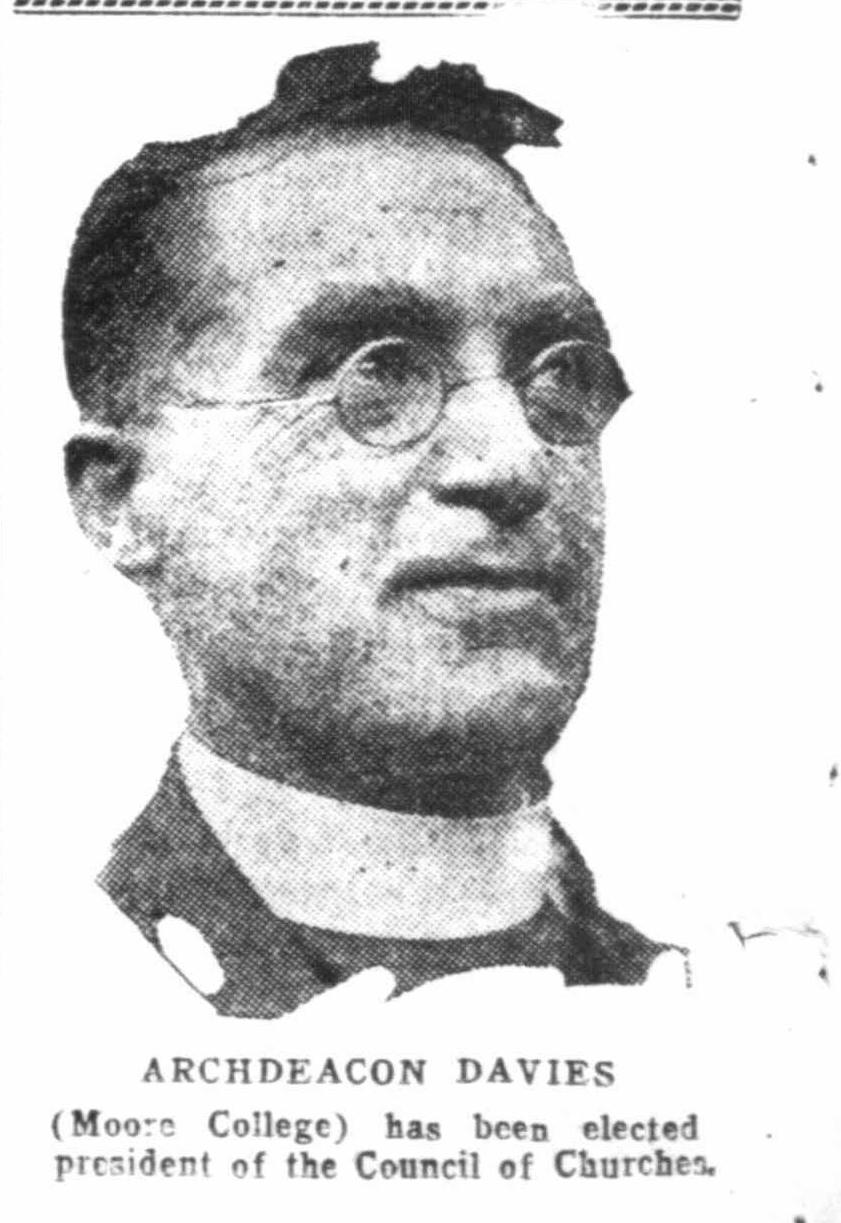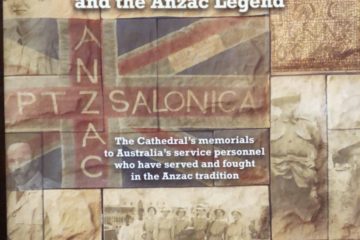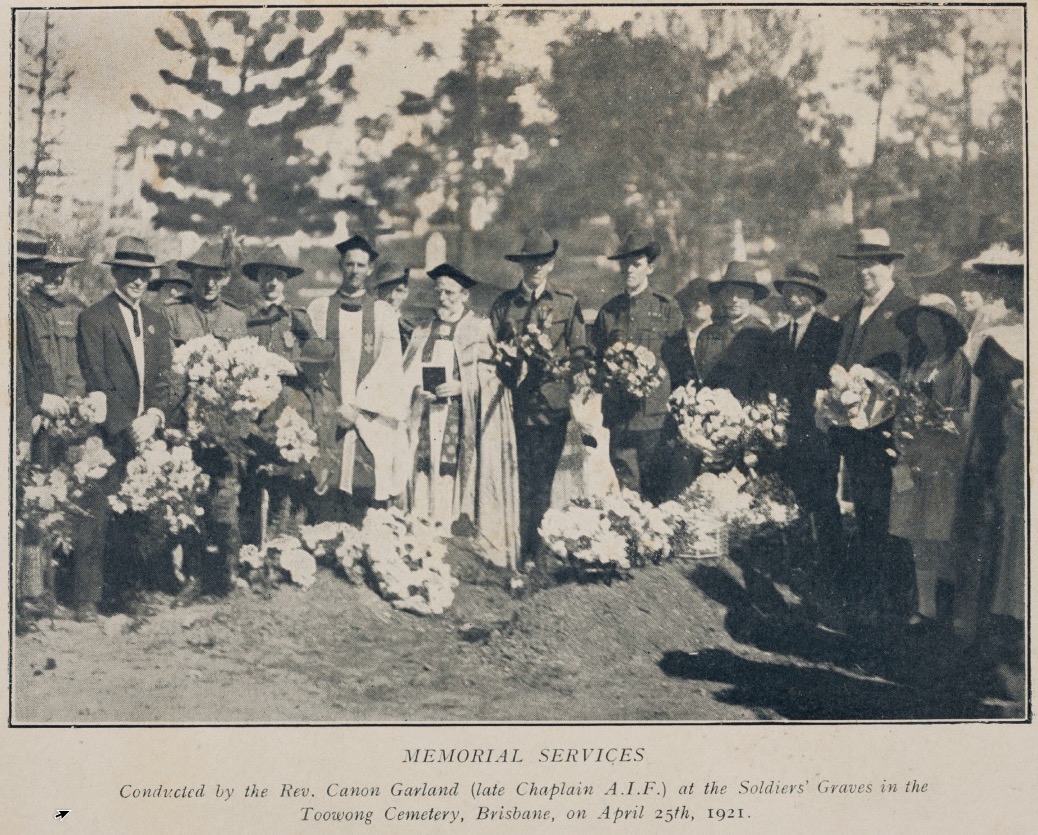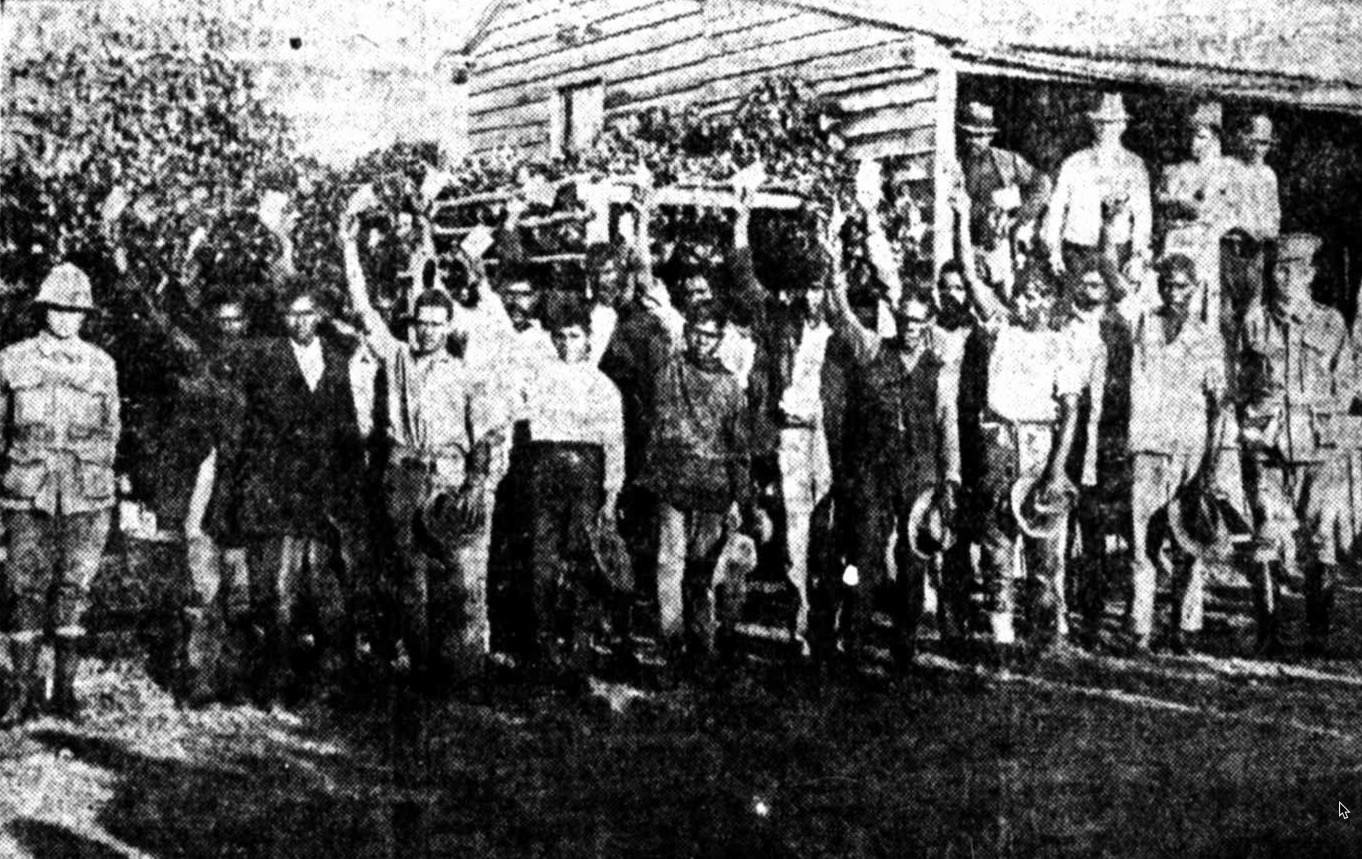Chaplain Davies honoured

ABOVE: Former First AIF chaplain, Church of England Archdeacon, the Venerable Alfred Davies, pictured in his later years. From page 20 of Brisbane’ s “The Sunday Mail” of 7 June 1931. Courtesy of Trove.
ST. JAMES’ RECTOR.
CHAPLAIN ON TROOPSHIP.
HONOURED BY PARISHIONERS.
LAST NIGHT’S PRESENTATIONS.
FOR a considerable time efforts have been made to ensure that no troopship should leave Australian shores unaccompanied by Chaplains.
Hitherto the practice of the authorities has been to provide salaried Chaplain on boats carrying large numbers of troops, but no provision has been made for the spiritual needs of men voyaging on transports carrying comparatively few.
It was strongly felt in the various churches that this should not be, and that men of different religious persuasions on transports should be accorded the spiritual privileges afforded others.
The Rev. A. Davies [ Alfred Davies ], rector of St. James’ Church [ Toowoomba ], was one of those who volunteered his services in this regard much earlier in the war.
His services, however, were not accepted until quite recently, when permission was accorded by the Defence Department for the Chaplains, Roman Catholic, Anglican and Non-Conformist, without salary, to accompany troops on vessels carrying a thousand or less men.
In consequence of such permission, Mr. Davies’ wish to make himself useful in this respect has now been gratified, for a week or two ago he was notified by the authorities that his offer had been accepted, and that he must hold himself in readiness to leave when called upon.
His patriotic action has been, and is, much appreciated by St. James’ parishioners.
It was also felt that the sacrifice Mr. Davies has entailed upon himself in volunteering to serve as a Chaplain should be recognised in as practical a way as possible. Consequently a subscription list was opened, and met with such instantaneous and ready response that, in a week or two, nearly £50 was subscribed.
Last evening, in St. James’ Parish Hall, a large and enthusiastic gathering attended to bid farewell and take part in the various presentations made their popular rector.
Mr. C. Blake [ Charlie Blake ] (one of the Church Wardens) occupied the chair while Archdeacon Rivers, the Rev. Canon Oakeley [ William Pearce Oakeley ], and Private R. Lightbody [ Robert Blaxland DeCourcy Lightbody ], with the guest of the evening, occupied seats on the platform.
Apologies for unavoidable absence, was received from the remaining Church Warden (Mr. J.C. Snell) [ John Cooke Snell ], Messrs. James Taylor, and G.G. Cory [ Gilbert Gostwyck Cory ].
The Chairman, in his opening remarks, referred to the circumstances which brought them together and stated that a committee taken the matter in hand, and in honour of the rector’s patriotic and Christian-like action in offering to do something on behalf of the soldiers, felt they could not let the occasion go by without showing, in a practical way, their esteem for their rector. (Applause.)
A good number of men belonging to the Church had enlisted. Some were fighting at the Front and others were in camp.
Mr. Davies’ action, he was sure, was one that the parishioners were proud of, for Mr. Davies was held in the very highest of esteem, both by the people of his parish and by the community of Toowoomba. (Applause.)

ABOVE: On 16 August 1916, the Reverend Alfred Davies, 49, a Church of England Chaplain to the all-volunteer First Imperial Force, boarded His Majesty’s Australian Troopship A42 “Boorara” from the Pinkenba Wharf at the mouth of the Brisbane River, bound for the Western Front. This excerpt is from the Australian Imperial Force Nominal Roll. AWM Item No. RCDIG1067809.
First, there was handed to the rector, a beautiful portable altar, of maple, inscribed with the words, “Presented to Captain-Chaplain Rev. A. Davies, by the parishioners of his parish, St. James’, Toowoomba, 24/7/16.”
The altar was complete in silver, pocket Communion set and Chalice, cruet and paten, also with altar linen.
This was followed by Mr. Blake handing to the rev. [ Reverend ] gentleman a completely-equipped suitcase made of English leather, and lined with pigskin, the mountings being of silver.
The weatherproof cover bore the recipient’s initials in gold on the cover. A travelling rug was also handed him on behalf of members of the choir.
In conclusion Mr. Davies was handed a “gold-lined” waist belt. With the money in the belt Mr. Blake hoped that Mr. Davies would be able to “meet any little requirements.”
Each gift was presented and accepted amid vociferous applause, and Mr. Blake, in conclusion, wished the rector Godspeed and a safe return to Toowoomba, in order that he might continue to carry on his good work. (Applause.)
Private R. Lightbody, who is a prominent member of the Church and who wore the uniform of the A.M.C. [ No. 17249, 25th Reinforcements, 6th Field Ambulance, Army Medical Corps ], was greeted most enthusiastically.
He referred to the good work that a Chaplain might accomplish and drew attention to the fact that there were some men in camp who did not know what a clergyman was – because they had never seen one. (Laughter .)
In hospitals their services were always appreciated by the men, while there were many who looked forward to the Sunday services.
He joined in with Mr. Blake wishing Mr. Davies Godspeed and a safe return to Toowoomba. (Applause.)
Archdeacon Rivers [ Arthur Richard Rivers ] was also greeted with applause on rising.
At the outset of his remarks he stated that when the Archbishop had told him Chaplains were able to go on the troopships, he knew there were men ready and willing to go. But it was a question of the parishes making the necessary sacrifice in allowing their rectors to go.
While clergymen were away it meant that six months’ work was left in the hands of strangers.
Referring to the men at present away fighting, and in camp, he did not wish to boast, and the adherents of the Church of England had supplied more than their proportion, and in that respect the responsibility resting with the Church was great.
The need for Chaplains would soon be met if Chaplains were desired, but that would leave the Church unsupplied.
He knew that to do the work among the soldiers one of the best and first men picked was Mr. Davies – (Applause.) – and he was sure Mr. Davies was the right man for the position, and that no more suitable man could have been chosen. (Applause.)
Canon Oakley, in a brief speech, further eulogised Mr. Davies. He remarked on the kindness Mr. Davies had over shown him and for that reason was sorry he was going away.
He was glad their rector was appointed to the position of Chaplain on a troopship, for he felt sure no better representative of the Church of England could have been secured.
The popular rector, on responding, was received with tremendous enthusiasm. He did not, he said, know how to express his thanks for all they had given him that evening.
Talking of the other days, when our men were returning sick and wounded from Gallipoli to Lemnos, said Mr. Davies, there was no Chaplain to minister to the sick and dying at Lemnos.
He spoke to the Archbishop about it, and the Archbishop stated that the Government would not allow Chaplains to go, and he (the speaker) answered him with the remark that the Church did not require the Government to do the work.
The Archbishop further stated that there was no money with which to send Chaplains. “Then,” he replied, “Liberate us and let us go.” (Loud applause.)
This offer, however, was at the time refused. Mr. Davies pointed out that he was not going to the Front, but was nevertheless going to try to teach men something.
“Then,” Mr. Davies continued, “the Archbishop came to me and asked me if I were prepared to go as a Chaplain, and as a Britisher and a Churchman, the only answer I could give was: ‘Yes.’ ” (Loud applause.)
Making it clear that he would be at no financial loss in consequence of going as a Chaplain without salary, the rector pointed out that his uniform had to be purchased as well as his other clothes and box.
He was told he would be allowed six months absence from his parish, but could not say how that period would be spent. If he went to England he would see his parents, but if not, his labours would take him elsewhere.
Speaking in his customary, candid way, Mr. Davies told his audience that their presents would not be appreciated if they did not lend that loyalty and help to the Rev. Mr. Rooks [ sic, Edmund Rooke ] and the Rev. A.T. Hope [ Albert Thomas Hope ], who would look after the parish during his absence.
More work would have to be done in the coming six months than had been done in the past, and he looked to them to co-operate with the clergy on the parish during that time.
In conclusion he gave a few words of advice to all present, and asked all to attend the celebration of the Holy Communion next Sunday. (Applause.)
A number of vocal items were rendered, while refreshments were handed round during the evening.
Owing to the absence from Toowoomba of his co-Churchwarden, Mr. J.C. Snell, practically the whole of the work associated with the presentations had fallen on Mr. Blake’s shoulders, but the burden was taken up with the greatest of good cheer by that gentleman, whose energy has served to carry the gift scheme through to such a successful conclusion.
The esteem in which the rector is held in the parish is signified by the fact that the individual amounts subscribed range from a shilling to guineas. Moreover, there are very few parishioners of St. James’ (who have not freely given towards the presentation fund.
– from page 4 of “The Darling Downs Gazette and Telegraph” (Toowoomba) of 25 July 1916.

ABOVE: With the first joint Australia-New Zealand fighting force preparing – on the other side of the world that very night, to be launched at the beaches of the Gallipoli Peninsula – newly-installed Rector of Toowoomba’s Church of England Parish of St James’s, the Reverend Alfred Davies – 454 days before he himself volunteered to minister to those same fighting men – reflected “…any morning we might open our newspapers and find that the second contingent of Queenslanders is in action. Shall we feel ready for social life and all kinds of entertainment then, when the sons of own land figure in those terrible casualty lists?” This article appeared on page 6 of “The Western Star and Roma Advertiser” (Roma), on 24 April 1915. Courtesy of Trove.


